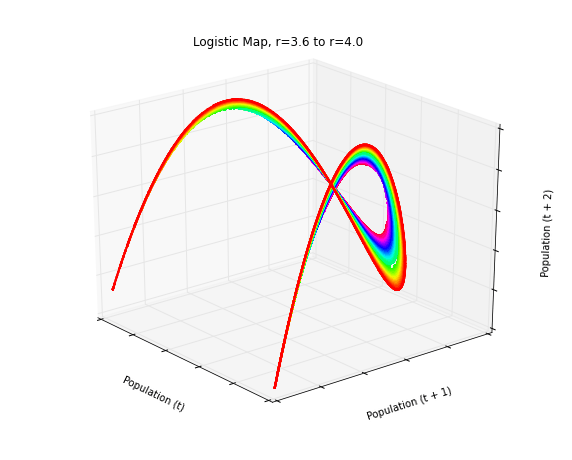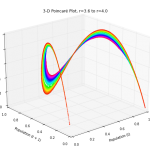In a previous post, I discussed chaos, fractals, and strange attractors. I also showed how to visualize them with static 3-D plots. Here, I’ll demonstrate how to create these animated visualizations using Python and matplotlib. All of my source code is available in this GitHub repo. By the end, we’ll produce animated data visualizations like this, in pure Python:
Tag: complexity
Visualizing Chaos and Randomness
In a previous post, I discussed chaos theory, fractals, and strange attractors – and their implications for knowledge and prediction of systems. I also briefly touched on how phase diagrams (or Poincaré plots) can help us visualize system attractors and differentiate chaotic behavior from true randomness.
In this post (adapted from this paper), I provide more detail on constructing and interpreting phase diagrams. These methods are particularly useful for discovering deterministic chaos in otherwise random-appearing time series data, as they visualize strange attractors. I’m using Python for all of these visualizations and the source code is available in this GitHub repo.
Chaos Theory and the Logistic Map
 Using Python to visualize chaos, fractals, and self-similarity to better understand the limits of knowledge and prediction. Download/cite the article here and try pynamical yourself.
Using Python to visualize chaos, fractals, and self-similarity to better understand the limits of knowledge and prediction. Download/cite the article here and try pynamical yourself.
Chaos theory is a branch of mathematics that deals with nonlinear dynamical systems. A system is just a set of interacting components that form a larger whole. Nonlinear means that due to feedback or multiplicative effects between the components, the whole becomes something greater than just adding up the individual parts. Lastly, dynamical means the system changes over time based on its current state. In the following piece (adapted from this article), I break down some of this jargon, visualize interesting characteristics of chaos, and discuss its implications for knowledge and prediction.
Chaotic systems are a simple sub-type of nonlinear dynamical systems. They may contain very few interacting parts and these may follow very simple rules, but these systems all have a very sensitive dependence on their initial conditions. Despite their deterministic simplicity, over time these systems can produce totally unpredictable and wildly divergent (aka, chaotic) behavior. Edward Lorenz, the father of chaos theory, described chaos as “when the present determines the future, but the approximate present does not approximately determine the future.”
LEED-ND and Neighborhood Livability
I recently co-authored a journal article titled LEED-ND and Livability Revisited, which won the Kaye Bock award. LEED-ND is a system for evaluating neighborhood design that was developed by CNU, USGBC, and NRDC. Many of its criteria, particularly site location and neighborhood pattern, accordingly reflect New Urbanist and Smart Growth principles and are inspired by traditional neighborhood design.
I recently completed my inside field exam, one of the many steps involved in advancing to candidacy. The three professors on your inside field committee send you six questions – a pair per professor – and you are given 72 hours total to answer one question from each pair. The answers are to be in the form of a scholarly article with thorough citations. Long story short, you’ve got to write 30 pages of academic scholarship in three days.
The exam questions themselves are very interesting. The professors construct them based on their reading of your inside field statement, trying to probe areas that might be particularly rich or a bit weak in the statement. Here are the questions I answered:
The Department of City and Regional Planning at UC Berkeley has a rather arduous process for advancing to candidacy in the PhD program. It essentially consists of 6 parts:
- Take all the required courses
- Produce an inside field statement – a sort of literature review and synthesis explaining the niche within urban planning in which you will be positioning your dissertation research
- Complete an outside field – sort of like what a minor was in college
- Take an inside field written exam
- Produce a defensible dissertation prospectus
- Take an oral comprehensive exam covering your inside field, your outside field, general planning theory and history, and finally presenting your prospectus.
Whew. Lots to do this year. The good news is I am currently wrapping up my inside field statement and preparing to take the inside field exam. My topic is generally around complexity theory in urban planning. Here is the working abstract from my statement:

